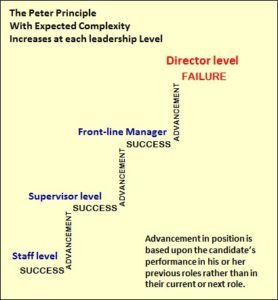In 1969, Laurence J.Peter and Raymond Hull sat down together to try to explain how to improve the workforce, and more specifically, the hierarchy in companies. Before finding a solution, they needed to determine the problem. With examples from all walks of life and solid logic, Peter and Hull believe to have done just that in The Peter Principle. The deciding factor, it would seem, is promotions that put employees in the wrong positions. So, what should you be considering before you promote?
The Peter Principle in a nutshell
The idea behind the theory comes from observing various hierarchies – both big and small – in many different fields of work. Laurence J. Peter noticed that there is an alarming number of examples of people rising in a company until they have reached “their level of incompetence”, as he puts it. Worse still, the principle implies that if you aren’t being promoted, you must be incompetent. As astounding as it may sound, his findings showed that workers could (and often do) keep climbing the social ladder until they get promoted to a position that they can’t handle. An employee could be great at his job, but not fit to direct a team, for example. Understanding that an employee’s performance in one job doesn’t guarantee success once in a slightly more important one could prevent unnecessary stress for everyone.
What to look for when promoting
When considering an employee for a promotion, you want to be sure they are up for the task. Here are some signs that could be telling you it’s time to move onto the next level:
- Good people skills: if you want to give someone more power, make sure other employees don’t take it badly. Furthermore, it’s important that the person you’re promoting is not only good at his job, but good with others. Giving orders and being respected by a team doesn’t come easily to everyone, so good people skills are a must when it comes to being in charge.
- Taking initiatives: If you have an employee who is constantly solving problems and suggesting new ideas to improve the team and the current project, then you might want to consider rewarding their initiatives. Being willing to go out on a limb is what leadership is all about.
- Organizational skills: It’s one thing to be behind the ideas, it’s another to work towards making them a reality. To do that, you need to be very organized, and good at organizing everyone else. If you have an employee who is great at sticking to a schedule and organizing their time at work, it could be interesting to see what they are capable of when they have more to handle.
- Participation in many company projects: Employees that show an interest in diverse projects the company is working on are the kind of employees you want to keep for two reasons:
- They are curious about and interested in the company, and not just in the work that has been assigned to them.
- They know what the company is planning to do in more than just one field. You don’t want someone with a lot of knowledge going to the competition because you haven’t appreciated their hard work.
- Strong company values: Employees that promote their company and share the same values are a huge asset. Research shows that most people believe employee feedback about a company to be the most trustworthy source when it comes to what a company is really like. If you notice an employee who embodies everything the company stands for, you don’t want to lose them!
- Restlessness and frustration: This might not seem like the best reason to promote someone, but happy employees means more efficient work. If you notice an employee is feeling underappreciated, it’s time to discuss what options work for both of you.
.For more information on recognising hidden talent, check out our article on How to Find Hidden Talented Leaders.
How to prepare your employee for a promotion
If you’ve made the decision to promote an employee, it’s a good idea to set a date straight away to follow up on the new workload. With new work comes new responsibilities and additional pressure. An employee can be affected both mentally and physically, so look out for some telltale signs:
- Fatigue
- Difficulty concentrating
- Stress
- Erratic behaviour (including irregular eating habits)
- Unusual hay fever
Stress has many ways of expressing itself so, yes, even hay fever could mean your employee is feeling overwhelmed by the workload. Being under too much pressure can lead to a burnout, which can be distressing for your employee and can cost the company a lot of money in sickleave (see Reducing Burnout and Improving the Employee Experience). By setting a date to review the new position, you will be able to assess whether or not your employee is the right fit for the job and even your employee will be relieved to know you’re looking out for their wellbeing. You can even consider calling it a “trial period” rather than a promotion until you are sure it works for everyone.
 When to promote and when to recruit
When to promote and when to recruit
While it’s nice to challenge your employees in new ways, sometimes they just aren’t ready for the responsibility. It’s just not possible to supervise and assist an employee in their new job forever. If you don’t see a noticeable improvement over the months after the promotion, you might need to consider looking outside of the office. You might even recruit rather than promote all together. Sometimes a fresh perspective on the company and the work can greatly improve the group dynamic and the productivity. In a company that is looking for innovative ideas and a more productive organization in the workplace, a new person to the staff can help break old habits and avoid repeating past mistakes. It all depends on why you were considering to promote an existing employee in the first place. Furthermore, introducing a new person to a hierarchy – instead of moving someone from one rank to another – can prevent jealousy among the colleagues that feel they deserved a promotion more.
We hope this article has been helpful! If you have any suggestions for our blog, don’t hesitate to leave your comments below.
Author: Ali Neill
As the job board tester and blog editor for the Jobboard Finder, Ali works on job boards from all around the world and keeps a close eye on the recruitment trends thanks to a number of sources, including the website’s social media pages.

























« DICE: Goodbye Germany, Goodbye UK
How to Recruit in Nepal »



 When to promote and when to recruit
When to promote and when to recruit